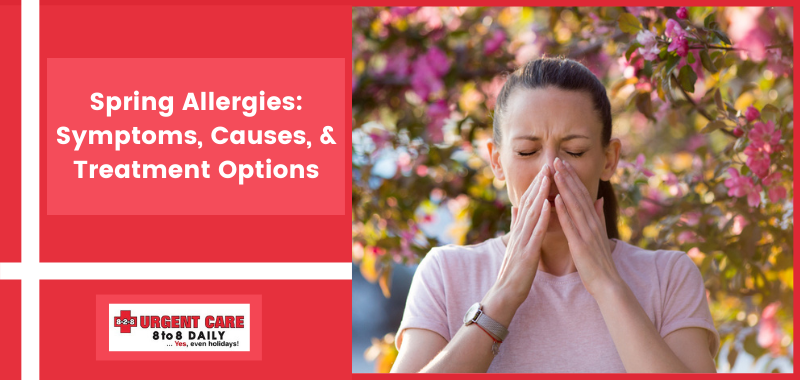


Spring can be a beautiful season, but it’s also the time for seasonal allergies. As spring begins, shrubs, foliage, grass, and trees tend to release pollen into the air. When the pollen count rises, this can trigger allergies when inhaled and cause all kinds of medical conditions. Depending on the state, the pollen count usually rises during March until early summer in the U.S.
These allergies are also known as allergic rhinitis or hay fever. This article will help you understand what can trigger spring allergies and how to prevent them.
Here are some effective tips to prepare for Allergy Season:
A thorough spring cleaning can include dusting everything from the bookcases to the light fixtures, sweeping floors and rugs, washing curtains, and even vacuuming the furniture. This will remove any pollen or dust that has made its way inside.
Track the days when the allergies are the worst to plan things accordingly. Stay inside during the early evening and midmorning to avoid peak pollen hours, or take antihistamines to prevent allergy symptoms while outdoors.
You can start taking medicines around two weeks before you generally start feeling the allergy symptoms. For reducing allergic reactions, you can use nasal steroid sprays and over-the-counter antihistamines. These can help ease the puffy nose and watery eyes and prevent inflammation.
The fresh breeze from outside might feel tempting, but it can also bring pollen inside your house. Keep your doors and windows closed to create a safe retreat during the peak pollen season.
Changing the air filter annually, before spring, or seasonally is always recommended. This can keep the air inside the house clean.
You may have some or all the symptoms mentioned below:
The following are the main triggers for spring allergies:
During late winter and early spring, the dormant trees bounce back to life and start to bloom, which releases pollen into the air. This makes tree pollen a trigger for spring allergies. Common triggers include eucalyptus, juniper, mulberry, oak, aspen, maple, olive, cedar, oak, etc.
Grass allergies are not as common, but some people who are very sensitive can have reactions caused by allergies. Among the various kinds of grasses that blanket the gardens, fields, and lawns, most commonly trigger reactions include Bermuda grass, Johnson grass, Kentucky bluegrass, Orchardgrass, Ryegrass, Sweet vernal grass, Timothy grass, etc.
Unlike pollen, mold doesn’t die due to the first frost. It thrives in damp outdoor and indoor environments (basements, leaf piles, bathrooms, rotten logs), stops growing, and lays dormant until warm weather.
Also known as dust mite waste, it is a very common indoor allergen found in many places around the house like bedding, stuffed toys, carpets, and furniture.
The following over the counter treatment options is generally recommended to treat spring allergies:
Decongestants can relieve swelling and congestion by shrinking the blood vessels in the nasal passageways.
Antihistamines can lower the amount of histamine in the body by reducing itching and sneezing
Eye drops can relieve watery and itchy eyes.
Nasal sprays help flush the sinuses and relieve the inflammation.
You should see a doctor if you feel that the quality of your life is being severely affected by the allergies. For instance, if you have persistent headaches, severe breathing problems, chronic sinus infections, or are unable to manage the symptoms of an allergic reaction, you should get urgent medical help or visit an allergy specialist.
If you're having persistent allergies that are not resolving, then it’s time to seek treatment? Visit 8 to 8 Urgent Care in Oceanside, CA, for the best medical services and treatment. Contact our team, and they will walk you through our new and more efficient self-check-in system.